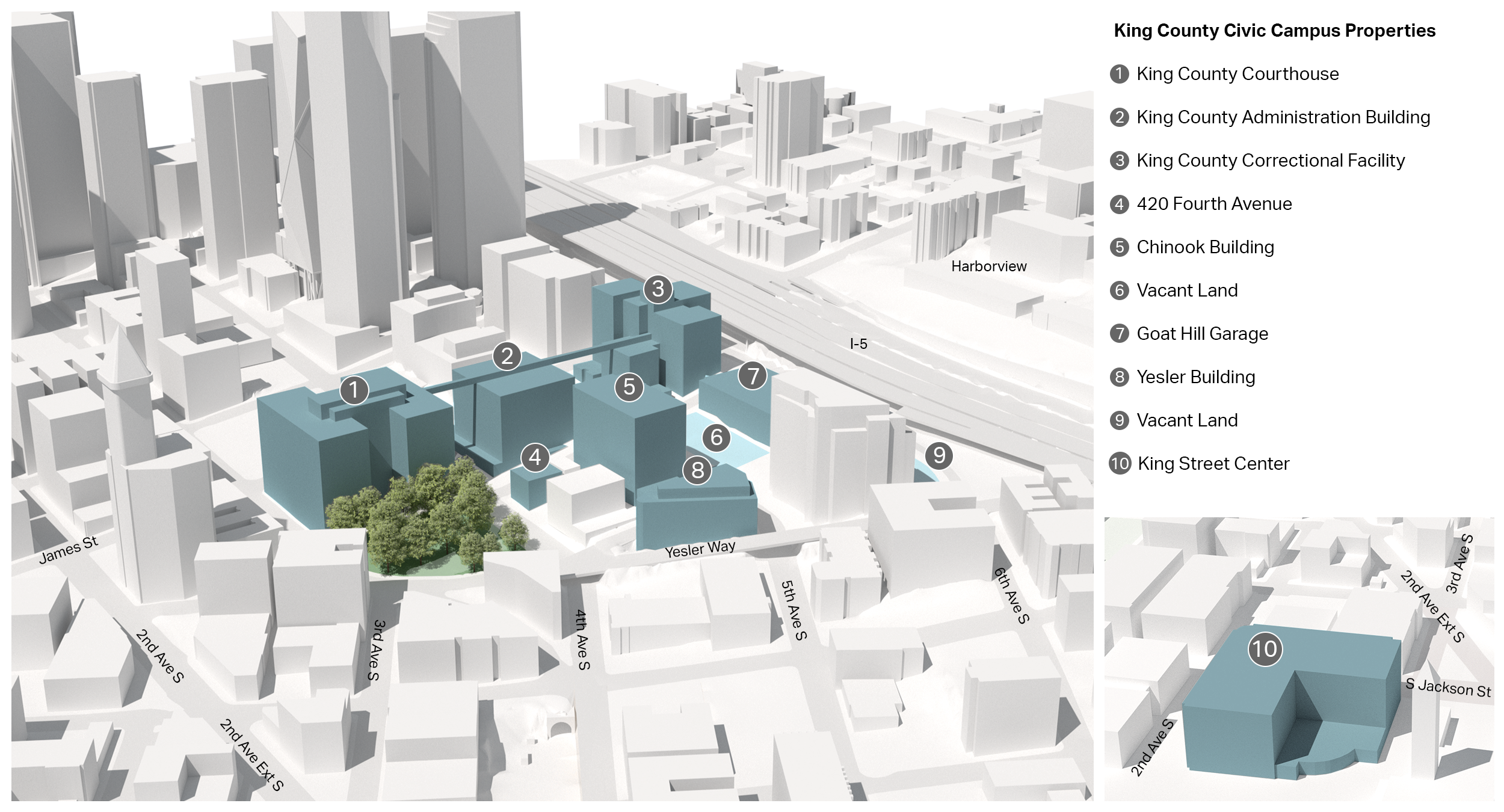Civic Campus Initiative
Background
King County owns and operates several facilities in downtown Seattle, most of which are on a civic campus centered on Fourth Avenue between James Street and Yesler Way. These include the King County Courthouse, King County Administration Building, King County Correctional Facility, Chinook Building, and Yesler Building. The county also owns King Street Center, located in Pioneer Square.
Over the decades, King County has made investments in these buildings to keep providing services to residents. However, many of them are underutilized, functionally obsolete, or are facing costly maintenance and repairs that may be financially unsustainable. Not only are some of these buildings at the end of their useful life, the area around the campus is often perceived as being unsafe.
New approaches to delivering health and human services, law enforcement, and criminal justice are also driving change at King County, and the COVID-19 pandemic forced governments at all levels to rethink how they deliver services to the public.

Directive
The King County Council directed a comprehensive assessment of existing building conditions and future space needs for downtown functions. The Civic Campus Initiative expands on this effort, looking ahead to 2045 and beyond to identify opportunities to deploy county services, leverage the value of county real estate assets, improve personal safety and security, and better engage and complement surrounding neighborhoods.
The current civic campus is spread over eight acres of land. There are eight buildings and ten sites, with a total of 2.3 million square feet of space in buildings. Under current zoning, these properties could allow for a total of 2.75 million square feet of non-residential development capacity. If used for residential purposes, this could allow for more than 7,000 housing units.
King County Executive Dow Constantine and the King County Council retained Northwest Studio, a practice of architects and urban designers based in Seattle, to lead the development of a King County Civic Campus Plan. The plan will provide the public and county leaders with viable options for facilities, campus investments, and public space uses over the next 25 years.
What's been done
In 2017, the Northwest Studio consultant team and the King County Facilities Management Division kicked off a four-phase planning effort:
- Phase I: Project Understanding/Data Gathering (2018)
- Phase II: Gap Analysis (2020)
- Phase III: Planning/Analysis (2019-2020)
- Phase IV: Strategic Plan Development and Actions (2020-ongoing)
The first step was to complete an initial assessment of current and future facility and operational needs and to develop a shared vision and guiding principles that will shape and help evaluate plan strategies. The vision and guiding principles were developed by stakeholders, clients, neighbors, and county officials and embraced by King County.
The Civic Campus Initiative is designed to help develop a strategic and holistic roadmap for improvements to county facilities, campus investments, and public spaces and civic uses over the next 25 years or more. Its intention is to help King County deliver more efficient and reliable customer services, including public health and criminal justice approaches, with improved government spaces and facilities. This planning effort is an opportunity to meet community needs and hopes for civic space by thinking creatively about how and where public services are delivered. Through innovation and collaboration, this project is foundational to revitalizing a key downtown neighborhood and restoring community and civic pride.
What's next
Working with the Northwest Studio team, King County continues to develop and refine a range of strategic approaches for how to improve county facilities and public spaces, and provide connections to nearby neighborhoods. There will be opportunities in the near future for residents, employees, and other stakeholders to get more information and provide their feedback on these efforts. Watch this webpage for details.
Community Advisory Group
- Downtown Emergency Services Center
- Downtown Seattle Association
- Alliance for Pioneer Square
- Nitze-Stagan
- Urban League of Metropolitan Seattle
- Seattle-King County Coalition on Homelessness
- Chief Seattle Club
- Seattle Chinatown International District Preservation and Development Authority (SCIDpda)
- SODO Business Improvement Area
- King County Coalition of Unions
- Washington State Bar Association
Government Partners Group
- King County Council
- King County Superior Court
- King County District Court
- King County Assessor's Office
- King County Elections
- King County Prosecuting Attorney's Office
- King County Facilities Management Division
- Seattle Mayor's Office
- Seattle City Council
- Seattle Design Commission
- Seattle Department of Neighborhoods
- Seattle Office of Planning and Community Development
- Seattle Department of Construction and Inspections
- Sound Transit
- 4 Culture
Vision
A welcoming, equitable, and enduring place, inspiring civic life, and serving the region
Guiding Principles
- Design for equity and fairness
- Build respectful civic experiences
- Create resilient working places
- Deliver financially sound projects
- Design beautifully restorative environments
- Contribute to a socially and economically vibrant community
- Anchor the process in King County's equity, racial, and social justice principles
2018 Oversight Committee
Dow Constantine
King County Executive and chair of Oversight Committee
Rod Dembowski
King County Council
Pete von Reichbauer
King County Council
Patti Cole-Tindall
King County Sheriff
Colleen Echohawk
Chief Seattle Club
Jon Scholes
Downtown Seattle Association
Maiko Winkler-Chin
Seattle International District Preservation Development Authority
Magda Hogness
City of Seattle Office of Planning and Community Development
Lyle Bicknell
City of Seattle Office of Planning and Community Development
Michael Gonzalez
King County Coalition of Unions and Teamsters 174
Matthew Combe
Seattle's 2030 District
Christopher Campbell, PhD
University of Washington Department of Urban Design and Planning
Brian Carter
4Culture
Judge Dean Lum
King County Superior Court
Leesa Manion
King County Prosecuting Attorney
Mike Stanley
Seneca Group
Lisa Howard
Alliance for Pioneer Square
Judge Susan Mahoney
King County District Court
John Arthur Wilson
King County Assessor
Julie Wise
King County Elections Director
 Translate
Translate